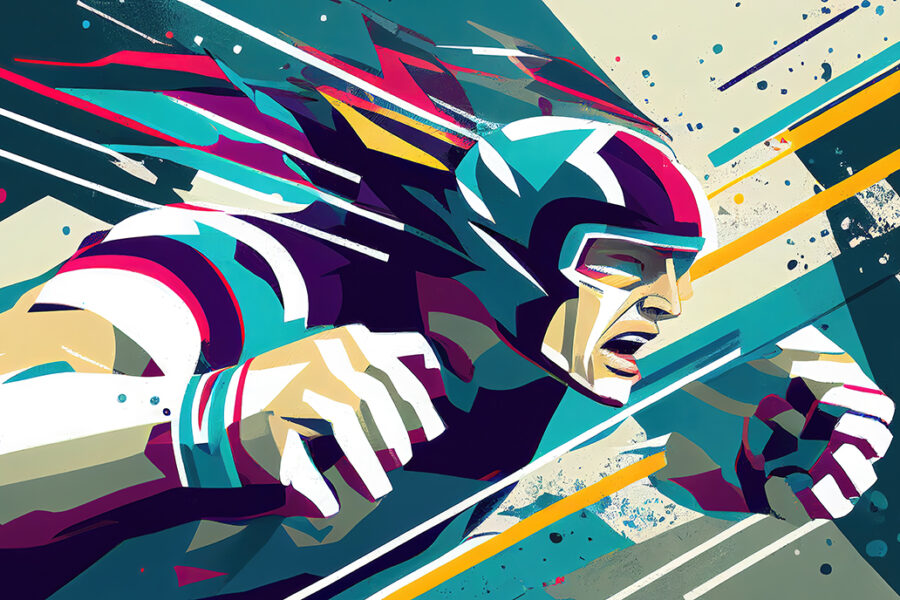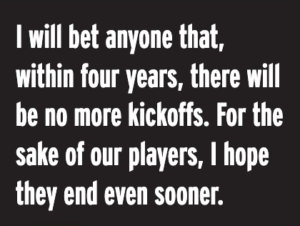
On Tuesday, May 23rd, the NFL owners adopted another new rule affecting kickoffs. Following in the footsteps of the NCAA, the NFL now allows for a fair catch on kickoffs, intending to curb the threat of injury. This rule will be the final change to one of the most injury-prone plays in the NFL. Next will be the total elimination of kickoffs. How do I know this? From my experience playing Special Teams for the Miami Dolphins, the Philadelphia Eagles, and the New England Patriots. Throughout all my years on Special Teams, kickoffs were the plays I hated the most.
In 1974, I was on all of the Eagles’ Special Teams. Back then, an injury timeout cost you a team timeout. Dick LeBeau, who played 14 years as a defensive back for the Detroit Lions, was our Special Teams Coach. During training camp, Coach LeBeau said, “I admire and respect you guys on the Kickoff and Kickoff Return Teams, but if you get injured on any Special Teams play, you must find a way to get off the field and not cause us to use a timeout! Timeouts are only used by the Offense and particularly the 2-minute drill! Crawl off if you must but get off the field!”
On October 20, 1974, the Eagles played the Dallas Cowboys in a shootout at the Texas Stadium. We played five kickoffs that day, and my job, and that of wide receiver Bobby Picard, was to knock down all four of the Dallas Cowboys’ four-man wedge. We were the Wedge Busters, a title which brings to mind the “Ghostbusters,” but our job was hazardous and no laughing matter. The four Dallas blockers, lined up shoulder to shoulder as steam rollers, stood from 6’3, 245 pounds at the smallest to 6’9, 271 pounds at the largest. Their lineup included the aptly named Ed “Too Tall” Jones, Harvey Martin, Jethro Pugh, and Josh Niland. I was 6’2, 220 pounds, and Picard was 6’1, 195 pounds—a mismatch on paper and on the field. We could only cut 3-4 of those guys down by throwing a precision cross-body block at their legs. Our impact would be like a minor auto crash.
On the fifth kickoff of that day, Picard and I begged Tom Dempsey, our placekicker, to kick the ball out of the end zone. He tried, but in attempting to put more force into the ball, he hit the ball flat, turning the play into a line drive. Let me tell you, this was the worst-case scenario. Bob Newhouse, the Cowboy receiving back and kickoff receiver, got to the ball faster than usual. Now the four-man wedge has a 10-yard running start at us. I closed my eyes as the wedge approached and threw a cross-body block. I got hit. Hard. I was blinded in my right eye and had tunnel vision in my left. My first thought was, “Get off the field.” Luckily, I knew which direction the Eagles’ sideline was. Aching, I stood and stumbled away. Then I heard Bill Bergey, our middle linebacker, yelling my name. He ran over to me and grabbed my face mask, straightening it, revealing that the previous play knocked my helmet sideways, blocking my vision. My left eye had been peering through the ear hole of my helmet, but I was too battered and full of adrenaline to notice. We lost that game 31-24, but I was glad not to be seriously injured.
Over the years that have passed, the four-man wedge became the two-man wedge, which then became no wedge at all. Now, we’re closing in on what may be the last years of NFL kickoffs. While past rule changes have mitigated injuries on the field, today’s NFL Players’ speed, size, and strength have offset the rules’ impact. As the league’s athletes continue to improve, we’ll see greater and more powerful clashes on the field. Therefore, despite any protective rule changes, there will be more injuries, concussions, and maybe worse. I will bet anyone that, within four years, there will be no more kickoffs. For the sake of our players, I hope they end even sooner.


